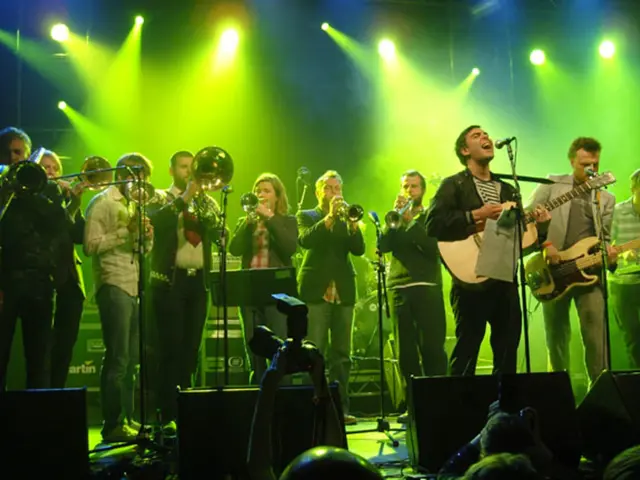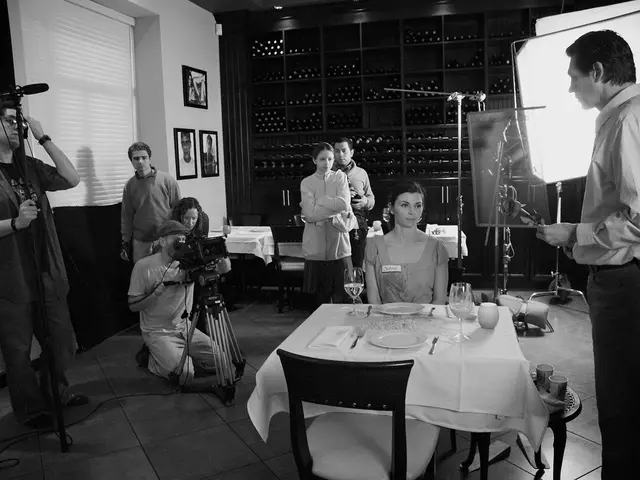Three individuals associated with the literary hub
Unwanted Tales of Old: Härtling, Strasser, Zwerenz
arranged a trip to antiquarian bookshops, the names you'd stumble upon repeatedly are Härtling, Strasser, Zwerenz. Names echoing a past era when, in West Germany, rows upon rows of thick books by questionable, bearded men were snapped up in bulk: Härtling, Strasser, Zwerenz. Names that today, few under 60 can connect the dots to.
Härtling, Strasser, Zwerenz - etched as writers in the pages of dusty book spines, had an unconventional hairstyle apiece - one of them, Mr. Strasser, still kickin'. And all three were Germans, freelancers hustling in the realm of scripting jargon and clichés. Staff writers, you might say, for the Social Democratic party.
Their portrait snaps often conveyed a look of distaste, as if they'd swallowed something sour.
These days, their opus is gathering dust in the depths of second-hand bookstores and forgotten shelves, retaining the life of the forgotten, erased from collective memory: no one remembers them, no one picks up their books, setting them free from the eternal agony of being the least wanted, unread, and cringe-worthy paperweights on the shelf. And those who do remember these prolific German scribes of the 70s, 80s, and 90s, are smart not to add their books to their collections. What would they do with them, after all? They've probably already got a paperweight or two.
Like their artistic ancestors, these aspiring literary titans, the second-stringers, longed for the spotlight just like their great models. Grass, Walser, Böll. They knew each other, after all. Strasser, in an interview about Grass: "He called, said he had red wine, invited me over. And that's how we met."
And, like their illustrious forefathers, the ambitious scribes hungered for recognition, sporting hippie beards, favoring turtlenecks, corduroy suits, and chunky glasses, each donning a unique coiffure that would make a staid religious teacher spit in envy. This much is clear: Social Democracy and style have never jived. On their portrait snaps, the men often exuded a look of distaste, as if they'd swallowed something sour.
Yet, on other occasions, the pain-stricken wordsmiths posed like jolly gingerbread horses after a sugar feast. "A trace of pain could be seen in his visage, in the fabric of his eyes, lurking in the corners of his smile, vibrating in his voice" (Germany Radio over Peter Härtling).
Thomas Blum contests the status quo. For now, he can't change it, but he can criticize it, call it out, or even give it a good shake if need be. The bad must retire. We champion his battle against the mundane. With that, "The Good Column" will make an appearance here on Mondays. The best of the best, curated just for you! Find it at: dasnd.de/diegute
It was likely people in the now misunderstood 70s and 80s who bought the books of these men in a bookstore, where they lined the shelves (books, not men). Some of the books, many published by well-respected publishers (Luchterhand, Piper, Kiepenheuer & Witsch, S. Fischer), may have actually been read. It's not entirely impossible.
What's left are the remaining fragments of Härtling's antivar poetry: "If everyone planted a flower, / every person on this earth, / and instead of shooting, danced / and paid with a smile instead of money - / if each one warmed another / without gloating about their strength - / then, so Härtling believed, 'strife and war' would vanish and a new 'era of man' would dawn." So, instead of combat, dance from now on! Thanks for listening.
Of Strasser's debut novel, published in 1987, Wolfgang Pohrt once penned that it was "swaddled in thick, fat-resistant plastic, containing a bookmark and an average of three lines of text per printed page, costing 38 DM, and offering boredom at ten times the price." Zwerenz, however, will forever be remembered for his "erotic" prose: "He rubbed his hands over her chest, caressed wherever he could reach. He swirled around in her gooey juices, his eyes fixed on her snapping snatch."
Perhaps, in time, the books of these unforgettable German authors should be recognized as the monuments of mid-20th-century literature that they were. Literature as it should not be. One thing is unquestionable: you don't have to read it.
In Perspective:
Härtling, Strasser, and Zwerenz made substantial contributions to the literary landscape of Germany and Austria during the mid-20th century. Although their works may not be as widely read or recognized today, their impact can still be felt within the context of their time.
- Peter Härtling (1933-2017):
- Härtling was a prolific German writer, poet, and critic whose influence waned with the passage of time. His works tend to explore themes of history, culture, and social issues. Some of his novel and essay experiments may no longer resonate with contemporary readers.
- Johano Strasser (1939-2017):
- Austrian author and artist Strasser exemplified the avant-garde movement in his work. His experimental style may have been ahead of its time and less accessible to modern audiences, but it earned him a niche following among historians and fans of avant-garde literature.
- Gerhard Zwerenz (1925-2015):
- Zwerenz was a German author and politician who rose to prominence in the 1960s and 1970s with his socially critical novels and essays. While his work was influential during his time, it may not be as widely read or considered relevant in the contemporary literary landscape due to thematic and cultural shifts.
- The works of Härtling, Strasser, and Zwerenz, despite being overlooked by many today, often lie tucked away in dusty book shops, serving as artistic relics of an era gone by.
- These influential authors, once popular in mid-20th century literary circles, continue to carry a certain mystique, their books occasionally picked up as a reminder of the intriguing entertainment found in their unconventional tales.








